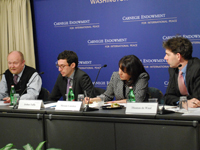Registration
You will receive an email confirming your registration.
IMGXYZ2791IMGZYXRecent developments in the North Caucasus have been marked by renewed instability and violence, causing Russian officials to publicly acknowledge that the region poses a serious problem for their country. Carnegie’s Alexey Malashenko was joined by Joshua Yaffa of Foreign Affairs and Miriam Lanskoy of the National Endowment for Democracy to discuss the situation in the North Caucasus. Carnegie’s Thomas de Waal moderated.
Deterioration
Despite the hopes raised by the creation of the new North Caucasian Federal District in January 2010, headed by Alexander Khloponin, the situation in the region has only deteriorated further and no progress is being made toward stability, Malashenko said.
- Civil war: Top Russian government officials, including President Medvedev, have publicly described the conflict in the North Caucasus as a civil war. Malashenko concurred with that assessment. The violence—which has occasionally flared as far as Moscow—has included weekly attacks and explosions, and assassination attempts on the lives of local leaders.
- Economic situation: Despite the absence of economic data, it is clear that the economic situation in the North Caucasus has also deteriorated. Furthermore, with its crumbling or destroyed infrastructure and the absence of a modern economic sector, the North Caucasus has become a region of “demodernization,” Malashenko said. Instability is also fueled by rampant unemployment, which various sources estimate to be between 30 and 70 percent. The emigration of ethnic Russians and educated locals has further contributed to the region’s poor economic situation.
- Security forces: Security forces are operating with brutality and impunity, which is further contributing to radicalization in the region, Yaffa said. The situation is further destabilized by the disconnect among different levels of security forces, which can make even direct orders from the Kremlin difficult to implement on the ground.
Islam and radicalization
Chechnya is experiencing parallel processes of Islamization and radicalization, the panel agreed.
- Religious agenda: The current unrest in Chechnya differs from the situation in the 1990s. Today’s insurgency is characterized not just by anti-state aims, but also by a religious agenda, Yaffa said. This religious dimension is evident in the insurgency’s efforts to target people and businesses it deems un-Islamic.
- Multiple influences: Fault lines in the conflict have shifted from primarily ethnic to religious, Yaffa said. Lanskoy argued that while the religious aspect of the conflict has grown, nationalism also remains a strong influence.
- A response to instability: The growing presence of religion in public life is evident across the board, and is becoming both a cause of and a response to instability: for instance, as part of a backlash against ineffective civil courts, Sharia courts are becoming more prevalent.
- A religious state: The Chechen insurgency would be content to live in a Sharia state under the Russia Federation, Yaffa suggested. Lanskoy agreed, pointing out that such an arrangement would be convenient for the extremists and for the Kremlin, but not for the civilians living in Chechnya.
Local Powers
- Khloponin: Inadequate leadership is partly responsible for the region’s continuing instability, Malashenko said. Alexander Khloponin, the Kremlin’s envoy to the North Caucasian Federal District, is perceived as a second-tier player rather than a strong representative of Moscow. As a result, the local political elites prefer to deal directly with the Kremlin. Khloponin’s authority is particularly weak in Chechnya, where he is perceived as subordinate to Chechen leader Ramzan Kadyrov.
- Kadyrov: Kadyrov has made progress in areas like reconstruction of war-torn areas, but his significant political weight and strong loyalty to Prime Minister Putin will make him difficult to control in the future, Malashenko said.
Georgia
Concerned about potential spillover from the violence in the North Caucasus, Georgia is setting out a new vision for its role in the region, Lanskoy said. Georgian foreign policy toward the Caucasus is changing, she said, highlighting as evidence the recent announcement of a visa-free regime. The panelists said that this could cause new tensions between Georgia and Russia. They also highlighted that the Sochi Winter Olympic Games of 2014 were a growing headache for the Russian government as they could be exploited by actors wishing to destabilize Russia.
